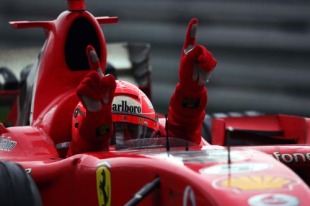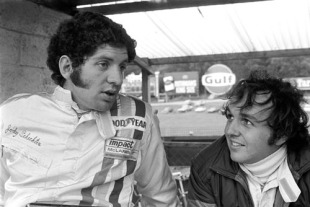
- Drivers:
- Rubens Barrichello
- |
- Niki Lauda
- |
- Riccardo Patrese
- |
- Jody Scheckter
- |
- Michael Schumacher
The way things are going this season it would be no surprise if Michael Schumacher won a race. If he does, would he break the record for the longest gap between victories? asked Rino Luppino
Michael Schumacher's last GP victory to date came nearly six years ago, in China in October 2006. But the record gap between GP wins is actually six and a half years, by the Italian Riccardo Patrese: his maiden victory came in the South African GP in October 1983, in a Brabham, but he had to wait until April 1990 for his next win, taking the chequered flag in the San Marino GP in a Williams. However, if Schumacher does win another race, he could become the first man to win GPs more than 20 years apart: his first success came in Belgium back in August 1992. He already holds the record (around 14 years) for longevity in this respect.
Which race did Niki Lauda win in a car fitted with a hoover - or, as we say in Germany, a "Staubsauger"? asked Fabian
The race in question was the Swedish GP of 1978, won by Niki Lauda in a Brabham BT46B. It had a radical design which involved a large circular rotor at the back, like a cooling fan - the car is most usually nicknamed the "fan car" - which helped suck air out from under the car, helping it adhere to the road. ("Ground effects", in which the cars were almost sucked down on to the road, were much in vogue then: if you look at photos of cars of the time you will see little skirts down the sides to prevent air from escaping that way.) But there was a problem: the fan threw out stones and other debris, making it dangerous to follow too closely behind. "It's like a bloody great vacuum cleaner," said Mario Andretti, who was destined to win the drivers' championship that year. "It throws muck and rubbish at you at a hell of a rate." The FIA took note, and the car was duly banned after winning its one and only Grand Prix.
Dario Franchitti just completed a hat-trick of victories in the Indy 500. Has any other British driver done this? asked James Milton
The short answer is no, Dario Franchitti is the first British driver to win the Indianapolis 500 on three occasions. In fact he's only the second non-American - after Helio Castroneves of Brazil - to win it three times. Five American drivers (Louis Meyer, Wilbur Shaw, Mauri Rose, Johnny Rutherford and Bobby Unser) have also won it on three occasions, but the overall record is four wins at the brickyard, by AJ Foyt, Al Unser (Bobby's brother) and Rick Mears. The only other British drivers to win it are Dan Wheldon (twice), Jim Clark and Graham Hill.
Was Rubens Barrichello the oldest man ever to be "Rookie of the Year" at Indianapolis? asked Robert Cawston
Rubens Barrichello, the man who has driven in more GPs (322) than anyone else, finished 11th in the 2012 Indy 500, his first-ever race on an oval circuit. At 40, he was a few months older than Nigel Mansell when he was Rookie of the Year there in 1993, but they both have to tip their hats to Lyn St James, who won the award in 1992 at the age of 45, when she also finished 11th. She did lose one rookie record in 2012, though: another former F1 driver, 48-year-old Jean Alesi, became the oldest person ever to make his debut in the Indianapolis 500, although his race didn't last long before his Lotus was rather embarrassingly black-flagged for being too slow.

According to the F1 journalist and historian Alan Henry, this was an early nickname given to the South African driver Jody Scheckter. On his arrival in F1, Scheckter was rather wild and woolly behind the wheel - if obviously fast and talented - and his frequent off-track excursions led to his being dubbed "Fletcher", after a baby gull in the book Jonathan Livingston Seagull (a best-seller at the time), which tried to fly too soon and kept crashing into the cliffs. Scheckter eventually calmed down, and his steadiness earned him the drivers' championship in 1979, ahead of his rapid but erratic Ferrari team-mate Gilles Villeneuve.
What race was the first to be called a Grand Prix? asked Jerome Moore
The first motor race called a Grand Prix ("grand prize") is usually accepted as being the French GP of 1906, held on a triangular-shaped track near Le Mans and won by the Hungarian driver Ferenc Szisz in a Renault. It was followed in 1907 by a race in Germany called the "Kaiserpreis" ("Kaiser's prize"), which is generally considered to be the first German GP. The first official world championship race was the British GP at Silverstone in May 1950. It was won by Nino Farina, who went on to win the inaugural drivers' title in his Alfa-Romeo. The other races that year were the Monaco, Swiss, Belgian, French and Italian GPs, as well as the Indianapolis 500 (which counted towards the championship until 1960).
If you want to ask Steven a question, use our feedback form. The most interesting questions will be answered here every other Friday. His long-running Ask Steven column on Cricinfo remains one of that site's most popular features
© ESPN Sports Media Ltd.
 If you want to ask Steven a question, use our feedback form. The most interesting questions will be answered here every other Friday. His long-running Ask Steven column on Cricinfo remains one of that site's most popular features Ask Steven features a number of experts, headed by Steven Lynch, who answer your questions across Formula One as well as a variety of other sports
If you want to ask Steven a question, use our feedback form. The most interesting questions will be answered here every other Friday. His long-running Ask Steven column on Cricinfo remains one of that site's most popular features Ask Steven features a number of experts, headed by Steven Lynch, who answer your questions across Formula One as well as a variety of other sports

